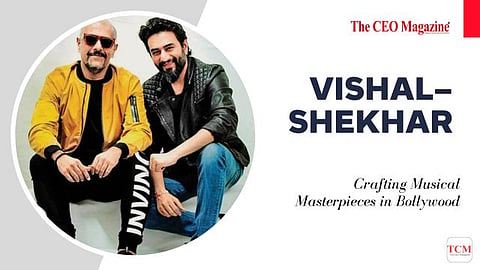
- News
- Women
- Magazine
- IndustryIndustry
- InsightsInsights
- Success Stories
- PublishPublish
- ContactContact
- Media KitMedia Kit

Vishal–Shekhar
In the vibrant tapestry of Bollywood music, Vishal Dadlani and Shekhar Ravjiani, collectively known as Vishal–Shekhar, stand as a dynamic and influential duo. Renowned for their prowess in music composition, production, singing, and songwriting, the duo has left an indelible mark on the Indian music industry. Let's delve into the musical journey of this exceptional pair, exploring their background, breakthroughs, and continued success.
Vishal Dadlani, also the vocalist of the Mumbai-based electronic band Pentagram, joined forces with his childhood friend Shekhar Ravjiani to form Vishal–Shekhar. Shekhar, a trained classical singer, learned to play the accordion from his music-enthusiast father, Hasmukh Ravjiani. The duo's collaboration began in the late 1990s, and their journey has since been nothing short of spectacular.
Vishal Dadlani's debut in Bollywood occurred with the composition of tracks for Tyger Productions' film "Pyaar Mein Kabhi Kabhi" (1999). Coincidentally, Shekhar Ravjiani also contributed to the same film. Recognising their shared passion for music, the duo officially formed Vishal–Shekhar, marking the beginning of a transformative musical journey.
Their initial forays as guest composers for films like "Champion" and "Rehnaa Hai Terre Dil Mein" paved the way for their first full soundtrack, "Vadh" (2002). This marked the inception of a partnership that would redefine Bollywood music.
Vishal–Shekhar gained widespread recognition with the soundtrack of "Jhankaar Beats" (2003), winning the Filmfare RD Burman Award for New Music Talent. Their success continued with hit soundtracks for "Supari" (2003), "Musafir" (2004), and "Waisa Bhi Hota Hai Part II" (2003), featuring the popular track "Allah Ke Bande."
The years 2005 and 2007 proved to be pivotal for the duo with successful soundtracks for films like "Dus," "Salaam Namaste," "Bluffmaster," "Golmaal: Fun Unlimited," "I See You," "Ta Ra Rum Pum," and the iconic "Om Shanti Om." The latter earned them the Best Composer Award at the 2nd Asian Film Awards.
Vishal–Shekhar's mainstream success reached its zenith in 2008 with blockbuster soundtracks for "Tashan," "De Taali," "Bachna Ae Haseeno," and "Dostana." The years that followed saw consistent hits with "Anjaana Anjaani" (2010), "I Hate Luv Storys" (2010), "Tees Maar Khan" (2010), "Ra. One" (2011), "The Dirty Picture" (2011), "Chennai Express" (2013), "Happy New Year" (2014), "Sultan" (2016), "Befikre" (2016), "Tiger Zinda Hai" (2017), "Bharat" (2019), and the upcoming "Pathaan" (2023).
Vishal–Shekhar's musical prowess has been duly recognised with numerous awards and nominations, including Filmfare Awards, Asian Film Awards, and Mirchi Music Awards. Their ability to create diverse and memorable soundtracks has solidified their status as one of the most successful music composers in the history of Bollywood music.
Vishal–Shekhar's journey is a testament to the transformative power of music. From their humble beginnings to becoming Bollywood's musical maestros, their contribution has resonated with audiences across the globe. As they continue to shape the sonic landscape of Indian cinema, Vishal–Shekhar remains an enduring force, creating melodies that transcend time and leave an everlasting imprint on the hearts of music enthusiasts.
Follow us on Google News
